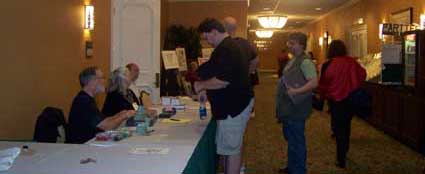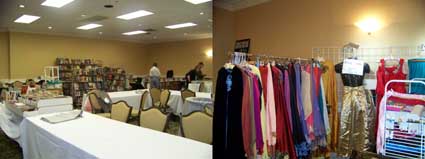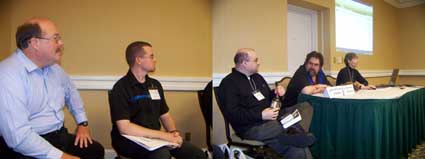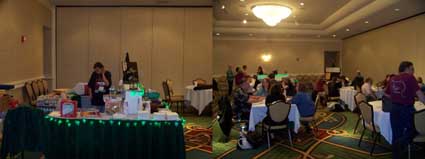Capclave 2008, Friday October 17th.
 Well, today is the first day of Capclave. Capclave is run by the Washington Science Fiction Association (WSFA) and is held each year in October. For the past several years it’s been in Rockville, MD and before that in Silver Springs, MD. As DC got more and more expensive the convention has had to mover further out to contain costs. We’re in the Hilton on Rockville Pike and within walking distance of lots of eateries — which is a big plus. The metro stop is behind the hotel adding convenience to those who don’t have or don’t want to use a car.
Well, today is the first day of Capclave. Capclave is run by the Washington Science Fiction Association (WSFA) and is held each year in October. For the past several years it’s been in Rockville, MD and before that in Silver Springs, MD. As DC got more and more expensive the convention has had to mover further out to contain costs. We’re in the Hilton on Rockville Pike and within walking distance of lots of eateries — which is a big plus. The metro stop is behind the hotel adding convenience to those who don’t have or don’t want to use a car.
We hustled in order to arrive in time for a 5 p.m. panel on Library Thing. Hyperion was supplying the laptop and internet connection so we had to get here on time.

Capclave Registration
When we arrived we checked in and got our room — it smelled strongly of perfume. When we first opened the door I thought someone had spilled a full bottle of perfume on the rug it was so bad. We checked with the desk and they were going to have housekeeping come and spray some neutralizer. We went to a panel. We came back — it still hit me strongly enough to cause shortness of breath. So, we walked over the the container store and bought some odor neutralizer spray. We’ve now sprayed heavily twice and it’s at least a bit better — I can breathe. Well, do it again in a minute because while I can breathe it triggered a headache. (Not a very happy camper about this. At least two other couples have complained about the perfume smell in their room. Others say they can’t smell anything. I haven’t talked to the guys in the next room but since they’ve been propping their door open when they’re in there, I believe they have the same problem. I’m suspecting a cleaning product of some sort.)

Dealers Room
We peeked into the ConSuite and the Dealers’ Room (which was still being set up). I took some pictures. We were in this hotel last year but they were still doing some construction then. They’re finished and it’s really a nice venue for a convention.

Library Thing Panel
5 p.m. Library Thing
Panelists: C. Alan Loewen, Danny Birt, David Edelman, Lawrence M. Schoen, and Colleen Cahill (moderator).
Basically, Colleen fired up Library Thing and took us on a tour of her favorite features. The authors called up their personal Library Thing pages. There was some discussion about the different use patterns between the authors who are using it to network with readers and get their works noticed and with readers who are just cataloging/reviewing/tagging books that they own and looking for the writers that they read. For authors, Library Thing allows them to list events they will be attending, speaking at, or signing. If you haven’t visited Library Thing, take a look because it’s a very nice resource.
We also checked out Shelfari and GoodReads and some other online resources for cataloging and managing your library, finding things to read or listen to. For a page of useful links on this subject, check out this Capclave page on Electronic Lib/Book Links.

Capclave Consuite
Next we visited the consuite had a short sit-down to check the schedule and speak with friends. And wait for the 7 p.m. panel. The Consuite is fairly large this year and set up with tables that seat about six each and then can be moved so you can have some nice seating groups. We checked back in after we ate at 9:30 and people had broken out the games (Parcheesi, Mahjongg). Others were just talking and having a good time catching up on what’s been happening to friends they only see at Capclave each year.

Manga and Graphic Novel Panel
7 p.m. Manga & Graphic Novel. What can these combinations of visual and print do differently from traditional films and print? What are some of the best examples and what makes them good? What SF works are being adapted and which ones should be?
Panelists: Lawrence M. Schoen, Steve Stiles, Drew Bittner (moderator), and Lawrence Watt-Evans.
This panel was extremely interesting, lively, and informative. All of the panelists were knowledgeable about comics, manga, and graphic novels.
Steve Stiles read some excerpts from an article he wrote about manga called “Manga-mania”. (I’m now trying to remember what he said so if any of this is wrong it’s me not him). Comics tradition began in Japan in 1862 when they used woodcuts to do their own version of Japan Punch. In 1947, the Might Atom was born and later became/transformed/turned into Astro Boy. Currently there are about 1 billion manga a year.
Manga are made for reading on commutes. For picking up and putting down and find your place easily. The chapters are short, usually about eight pages.
The panel agreed that the people who create the comics are usually science fiction and fantasy fans but unfortunately those who buy them are usually only interested in superhero beating people up or being beaten up. So, there’s not much science fiction and fantasy in American comics.
Comics usually come out monthly. While comics can tell a story over several issues and complete it they usually never end. At the end of the story the hero is still alive and ready to go on another adventure. Graphic novels on the other hand do come to an end — they’re a closed story.
They also talked about how now-a-days, the cutting edge comics are online, and usually free. The comic artists make their money in various ways by advertisements on their sites, by publishing collections of their comics, or from donations. Some artists actually support themselves this way. The entry cost for doing comics online is very low and the problem is that the entry cost is very low.
Some of the online comics recommended by the panel were: Girl Genius, Schlock Mercenary, A Miracle of Science, and xkcd. Surprisingly I was at least familiar with the names of all of these even if I don’t regularly read them all.
Lawrence Watt-Evans said that he has links to the web comics that he enjoys on his LiveJournal. (Sorry, I couldn’t find the link).
By now it’s 8 p.m. and I haven’t eaten since breakfast, so we go in search of food and odor neutralizer. I’ve pretty much covered the convention so far and am ready to sleep. Tomorrow is day two and the programming doesn’t start until 10 a.m.




